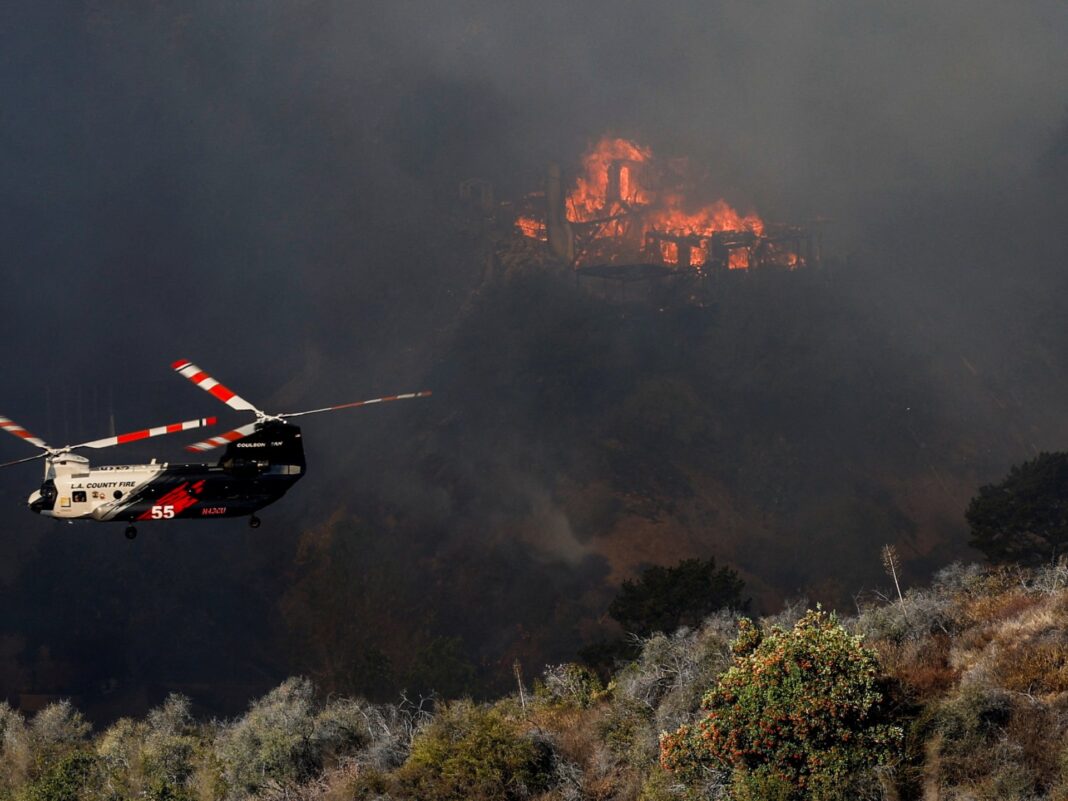Evacuation orders throughout the Los Angeles area cover 153,000 residents, with 57,000 structures at risk.
Firefighters are racing to cut off spreading wildfires around Los Angeles before potentially strong winds return, while new evacuation warnings left more homeowners on edge.
An intense effort was under way on Saturday in the upscale Los Angeles neighbourhood of Pacific Palisades, after the wildfire there expanded into additional areas overnight.
Residents were warned of potential worsening weather conditions over the coming days that could further stoke the blaze.
Cal Fire official Todd Hopkins told reporters at a news conference that the Palisades Fire had spread into the Mandeville Canyon neighbourhood and threatened to jump into Brentwood, an upscale neighbourhood.
Cal Fire Operations Chief Christian Litz said a main focus on Saturday would be the Palisades Fire burning in the canyon area, not far from the UCLA campus.
“We need to be aggressive out there,” Litz said.
Meanwhile, evacuation orders throughout the Los Angeles area now cover 153,000 residents, with 57,000 structures at risk.
Another 166,000 residents have been warned that they may have to evacuate, said Los Angeles County Sheriff Robert Luna.
Luna added that his agency has dispatched 40 search-and-rescue team workers to work jointly with other agencies, including the use of cadaver dogs to search for remains of victims and to help reunite families that have been separated.
At least 11 killed
Six simultaneous blazes that have ripped across Los Angeles County neighbourhoods since Tuesday have killed at least 11 people, and damaged or destroyed 10,000 structures – a term that includes homes, apartment buildings, businesses, outbuildings and vehicles.
At least 13 people are estimated to be missing so far. The death toll is expected to mount when firefighters are able to conduct house-to-house searches.
The fierce Santa Ana winds that fanned the infernos eased on Friday night. But the Palisades Fire on the city’s western edge was heading in a new direction as winds came off the Pacific Ocean and threatened the heavily populated San Fernando Valley foothills.
The fire, the most destructive in the history of Los Angeles, has razed whole neighbourhoods to the ground, leaving just the smouldering ruins of what had been people’s homes and possessions.
Before the latest flare-up, firefighters had reported progress in subduing the Palisades Fire and the Eaton Fire in the foothills east of the metropolis after it burned out of control for days.
On Saturday, the Palisades Fire was 11 percent contained and the Eaton Fire in the east was 15 percent contained, state agency Cal Fire said.
The two big fires combined had consumed more than 36,000 acres (14,500 hectares), or 56 square miles (145.6sq km) – 2.5 times the land area of Manhattan.
Seven neighbouring states, the federal government and Canada have rushed aid to California, bolstering aerial teams dropping water and fire retardant on the flaming hills and crews on the ground attacking fire lines with hand tools and hoses.
Winds predicted to slow
The National Weather Service said that conditions in the Los Angeles area would improve through the weekend, with sustained winds slowing to about 20mph (32km/h), gusting between 35mph and 50mph (56-80-km/h).
“It’s not as gusty, so that should help firefighters,” NWS meteorologist Allison Santorelli said, adding that conditions were still critical with low humidity and dry vegetation.
Officials have declared a public health emergency due to the thick, toxic smoke.
Private forecaster AccuWeather estimated the damage and economic loss at $135bn to $150bn, portending an arduous recovery and soaring homeowners’ insurance costs.
President Joe Biden has declared the fires a major disaster and said the US government would reimburse 100 percent of the recovery for the next six months.


